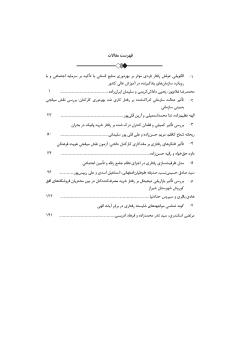گونه شناسی مواجهه های شایسته رفتاری در برابر آیات الهی
محورهای موضوعی : مطالعات رفتاری در مدیریتمرتضی اسکندری 1 , سیدنادر محمدزاده 2 * , فرهاد ادریسی 3
1 - گروه علوم قرآن و حدیث، واحد زنجان، دانشگاه آزاد اسلامی، زنجان، ایران
2 - گروه ادیان و عرفان، واحد زنجان، دانشگاه آزاد اسلامی، زنجان، ایران
3 - گروه علوم قرآن و حدیث، واحد زنجان، دانشگاه آزاد اسلامی، زنجان، ایران
کلید واژه: گونه شناسی, آیه, رفتار, شایسته ,
چکیده مقاله :
قرآن کریم از انواع برخوردها و مواجهه ها با آیات خدا سخن می گوید؛ خواه آیات قرآن و خواه آیات آفرینش. مواجهه در برابر آیات الهی از اعتقاد آدمی نشأت میگیرد و در اعمال و رفتار او بروز داده میشود و بدین گونه برخوردها به دو گونه ی اعتقادی و رفتاری تقسیم بندی میگردند. برخی به صورت شایسته و مناسب در برابر آیات الهی رفتار میکنند و برخی برای رسیدن به مقاصد دنیوی خویش، حقّ آیات را زیر پا میگذارند و رفتارهای ناشایست و نامناسبی را در برابر آیات، از خود بروز میدهند. قرآن نیز بنا به تربیتی بودن مطالبش بر روی مواجهه های غیرشایسته و شایسته تأکید میکند و به ذکر جزئیات بیشتری در مورد برخوردهای غیرشایسته و شایسته میپردازد. رفتارهای مناسب و شایسته و بایسته همچون: دیدن و شنیدن آیات، تدبر، تفکر، تفقه و تعقل در آیات و تذکر از آنها، شکر، گریه، سجده و ازدیاد ایمان در برابر آیات، یقین به آنها و ...، و رفتارهای نامناسب و ناشایست و ناپسند، مانند: کوری و کری در قبال آیات، بی توجهی و غفلت و اعراض از آنها، مجادله و خوض باطل در آنها، نسیان آیات، کوچک شمردن و استهزاء آنها، مرور از کنار آیات و بی توجهی به آنها، دریافت آیات و منسلخ شدن از آنها، فروختن آیات به بهای ناچیز، ظلم و مکر در حق آیات و بستن راه مردم به سوی آنها، کفر، جحد، الحاد، عناد و تکذیب آیات و ... . در این مقاله مواجهه های شایسته رفتاری در برابر آیات الهی استخراج شده و بحث و بررسی در رابطه با ماهیت اصلی و حقیقی آنها صورت گرفته است.
The Holy Quran talks about all kinds of encounters and behaviors with God's verses; Be it the verses of the Qur'an or the verses of creation. Confrontation with God's verses originates from a person's belief and is expressed in her actions and behavior, and in this way, confrontations are divided into two types of belief and behavior. Some behave in a proper and appropriate manner in front of the divine verses, and some violate the rights of the verses in order to achieve their worldly goals and show inappropriate behavior in front of the verses
The Quran, due to its educational nature, emphasizes more on unworthy and worthy inappropriate encounters and mentions more details about unworthy and worthy encounters
Decent and necessary behaviors such as: seeing and hearing the verses, thinking, understanding and reminding of the verses, gratitude, crying, prostrating and increasing faith in the verses, certainty in them and
And unbecoming and unseemly behaviors, such as: blindness and deafness to the verses, inattention and negligently and complaints about them, disputing in them, forgetting the verses, belittling and mocking them, looking past the verses and ignoring them, accepting the verses and being removed from them, selling the verses for a small price, oppression and deceit in the right of the verses and blocking people's way to them, disbelief, atheism, obstinacy and Denying the verses and
This article, hoping to God, aims to firstly extract the worthy behavioral encounters with the divine verses, then discuss and examine their original and true nature, and in this way, take advantage of various interpretations
فهرست منابع فارسی و عربی 1. قرآن ( ترجمه فولادوند)
2. مجلسی، محمدباقر، بحارالانوار، مؤسّسة الوفاء، بيروت، 1404 ق
3. طیب، سید عبدالحسین، تفسیراطیب البیان، انتشارات اسلام، تهران، 1378ش
4. مصطفوی، حسن، تفسير روشن، مركز نشر كتاب، تهران،1380 ش
5. مکارم شیرازی، ناصر، تفسیر نمونه، تهران، دارالکتب الاسلامیه، ۱۳۷4 ش
6. طباطبايی، سيد محمد حسين، الميزان فی تفسير القرآن، دفتر انتشارات اسلامی جامعهی مدرسين حوزه علميه قم، 1417 ق
7. طبرسی، فضل بن حسن، مجمع البيان فی تفسير القرآن، ترجمه و تحقيق: رضا ستوده، انتشارات فراهانی، تهران،1360 ش
8. جوادی آملی، عبدالله، تفسیر تسنیم، تنظیم و ویرایش: علی اسلامی، قم، اسراء، چاپ اول، 1381ش
9. راغب اصفهانی، حسین بن محمد، المفردات في غريب القرآن، دمشق، دارالعلم الدارالشامیه، 1412ق
10. مصطفوی، حسن، التحقیق فی کلمات القرآن الکریم، وزارت فرهنگ و ارشاد اسلامی، تهران،١٣٧١
11. نهج البلاغه، قم، انتشارات دارالهجره
1. Qur'an (translation by Fouladvand)
2. Majlesi, Mohammad Bagher, Bihar al-Anwar, Al-Wafa Foundation, Beirut, 1404 AH
3. Tayyeb, Seyyed Abdul Hossein, Tafsir Atyib al-Bayan, Islam Publications, Tehran, 1378
4. Mostafavi, Hassan, Tafsir Roshan, Book publishing center, Tehran, 1380
5. Makarem Shirazi, Nasser, Tafsir al-Nashon, Tehran, Dar al-Kitab al-Islamiya, 1374
6. Tabatabayi, Seyyed Mohammad Hossein, Al-Mizan fi Tafsir al-Qur'an, Islamic Publications Office of the Qom Seminary Community of Teachers, 1417 A.H.
7. Tabarsi, Fazl bin Hassan, Majma al-Bayan fi Tafsir al-Qur'an, translation and research: Reza Sotoudeh, Farahani Publications, Tehran, 1360
8. Javadi Amoli, Abdullah, Tafsir Tasnim, arranged and edited by: Ali Eslami, Qom, Esra, first edition, 1381
9. Ragheb Esfahani, Hossein bin Muhammad, al-Mufardat fi Gharib al-Qur'an, Damascus, Dar al-Alam al-Dar al-Shamiya, 1412 AH
10. Mostafavi, Hassan, Tahaqiq fi kalamat al-Qur'an al-Karim, Ministry of Culture and Islamic Guidance, Tehran, 1371
11. Nahj al-Balagheh, Qom, Dar al-Hijra Publications

